OTHER VOLUMES IN THIS SERIES John Ashbery, editor, The Best American Poetry 1988 Donald Hall, editor, The Best American Poetry 1989 Jorie Graham, editor, The Best American Poetry 1990 Mark Strand, editor, The Best American Poetry 1991 Charles Simic, editor, The Best American Poetry 1992 Louise Glck, editor, The Best American Poetry 1993 A. R. Ammons, editor, The Best American Poetry 1994 Richard Howard, editor, The Best American Poetry 1995 Adrienne Rich, editor, The Best American Poetry 1996 James Tate, editor, The Best American Poetry 1997 Harold Bloom, editor, The Best of the Best American Poetry 19881997 John Hollander, editor, The Best American Poetry 1998 Robert Bly, editor, The Best American Poetry 1999 Rita Dove, editor, The Best American Poetry 2000 Robert Hass, editor, The Best American Poetry 2001 Robert Creeley, editor, The Best American Poetry 2002 Yusef Komunyakaa, editor, The Best American Poetry 2003 Lyn Hejinian, editor, The Best American Poetry 2004 Paul Muldoon, editor, The Best American Poetry 2005 Billy Collins, editor, The Best American Poetry 2006 Heather McHugh, editor, The Best American Poetry 2007 Charles Wright, editor, The Best American Poetry 2008 David Wagoner, editor, The Best American Poetry 2009 Amy Gerstler, editor, The Best American Poetry 2010 Kevin Young, editor, The Best American Poetry 2011 Mark Doty, editor, The Best American Poetry 2012 Thank you for downloading this Scribner eBook.
Join our mailing list and get updates on new releases, deals, bonus content and other great books from Scribner and Simon & Schuster. C LICK H ERE T O S IGN U P or visit us online to sign up at
eBookNews.SimonandSchuster.com
CONTENTS
For Glen Hartley David Lehman was born in New York City in 1948, the son of refugees from Nazi Germany and Austria. Educated at Stuyvesant High School and Columbia University, he went to Clare College, Cambridge, on a two-year Kellett Fellowship and worked as Lionel Trillings research assistant on his return to New York.
He is the author of eight books of poetry, including Yeshiva Boys (2009), When a Woman Loves a Man (2005), The Daily Mirror (2000), and Valentine Place (1996), from Scribner, and Operation Memory (1990) and An Alternative to Speech (1986), from Princeton University Press. He is the editor of The Oxford Book of American Poetry (Oxford University Press, 2006) and Great American Prose Poems: From Poe to the Present (Scribner, 2003). A Fine Romance: Jewish Songwriters, American Songs (Nextbook/Schocken), his most recent nonfiction book, won the Deems Taylor Award from the American Society of Composers, Authors and Publishers (ASCAP) in 2010. Among Lehmans other books are a study in detective novels ( The Perfect Murder ), a group portrait of the New York School of poets ( The Last Avant-Garde ), and an account of the scandal sparked by the revelation that a Yale University eminence had written for a collaborationist newspaper in his native Belgium ( Signs of the Times: Deconstruction and the Fall of Paul de Man ). Lehman initiated The Best American Poetry series in 1988.
FOREWORD
by David Lehman

Forty years ago, two professors working independentlyHarvards Walter Jackson Bate and Yales Harold Bloomchanged the way we think about literary tradition.
FOREWORD
by David Lehman

Forty years ago, two professors working independentlyHarvards Walter Jackson Bate and Yales Harold Bloomchanged the way we think about literary tradition.
In The Burden of the Past and the English Poet (1970), Bate challenged the idea that literary influence was a largely benign activity on the model of mentor and sometimes rebellious pupil. In The Anxiety of Influence (1973), Bloom went further and propounded a compelling new theory, which quickly caught on. Students today learn that poets labor under the weight of their self-chosen mastersthat, for example, the Romantic poets had Milton on the brain or that James Merrill in the United States and James Fenton in Britain illustrate two rival ways of absorbing the masterly influence of the transatlantic W. H. Auden. The encounter with the master is bound to provoke anxiety.
What the latecomer does with that anxiety determines his or her chances at originality. Anxiety can certainly prove a source for poetry. When, for a commemorative volume, Bloom selected poems from the first ten years of The Best American Poetry, it is telling that he chose two poems that are not about anxiety as much as they appear to spring from it: Anxietys Prosody by A. R. Ammons from the 1989 volume (ed. Donald Hall) and John Ashberys The Problem of Anxiety from that of 1997 (ed.
James Tate). Blooms theory may help us practically in our confrontations with such works and their authors. His love of poetry, the passion on display when he quotes touchstone passages from his prodigious memory, make an essay of his, whether on Hamlet or the King James Bible, Walter Pater or Walt Whitman, a profound and at times sublime experience. Yet I contend that the process by which one poet assimilates the influence of another is not always quite so joyless, anxiety-ridden, or bereft of affection, as the theory would seem to imply. The pugilistic metaphors that appealed to Hemingway and Norman Mailer dont quite fit. The competition between and among poets is more like a team sportyou have teammates as well as opponents, you play for a chance at post-season glory (the sportswriters call it immortality), but you also play the occasional exhibition game (U.S.) or friendly (Britain).
The best poetry anthologies demonstrate that there is often an element of sport and gamesmanship in the way that a poet can take note of an ancestor, an ally, or a rival. And in consequence, its as though the poems they write are engaged in a dialogue. To one who loves poetry and teaches Marvells The Garden in relation to the first three chapters of Genesis, or William Carlos Williamss Pictures from Brueghel in relation to poems by W. H. Auden and John Berryman on the same paintings, it seems a self-evident proposition that poems partner with other poems. M. M.
Forsters metaphor in Aspects of the Novel applies to poemshe imagines a timeless British Museum Reading Room where the books of any and all eras may converse among themselves, sharing secrets and trading intimacies. I love the metaphor but would amend it to say that favorite poems have a way of pairing off, like the characters of certain bookslike Don Quixote and Sancho Panza, say, or Holmes and Watson, or Beatrice and Benedick in Much Ado About Nothing that continue to live after the reader has returned them to the shelf. Looking over the poems published in The Best American Poetry over the last twenty-five years, I am struck by the number of such poem pairings. In The Best American Poetry 2012 (ed. Mark Doty), Jennifer Chang and Angelo Nikolopoulos react to Wordsworths daffodils just as Billy Collins, back in the 1998 edition (ed. John Hollander), responded to the same poets Tintern Abbey.
Also in the 2012 volume, Amy Glynn Greacen confronts William Blake on the matter of the sunflower (and fie, / By the way, on any and all, whod think to call / You weary of time), and David Mason addresses the gap between Shelleys life and his idealsthe subject of a poem by Galway Kinnell that Paul Muldoon chose for The Best American Poetry 2005 . In 1999 (ed. Robert Bly), John Brehms Sea of Faith ponders Matthew Arnolds Dover Beach; in 2001 (ed. Robert Hass), Alan Feldmans Contemporary American Poetry struggles with Donald Halls Kicking the Leaves; in 2008 (ed. Charles Wright), Ron Padgetts Method, or Kenneth Koch pays homage to a mentor; in 2007 (ed. Heather McHugh), Albert Goldbarths poem takes its title from Robert Frosts Stopping by Woods on a Snowy Evening, with which it has a lovers quarrel.
Next page
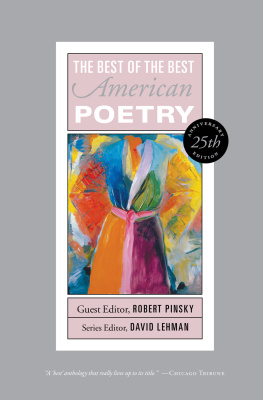
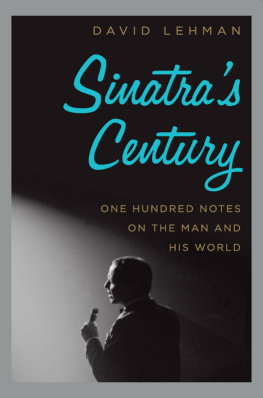
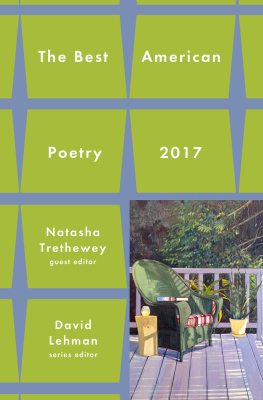
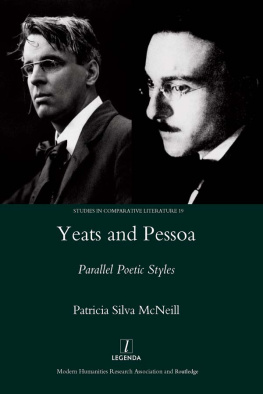
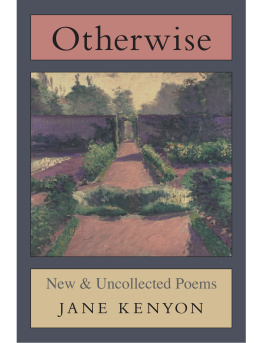
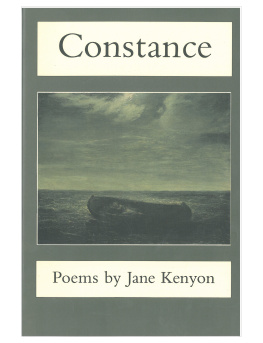
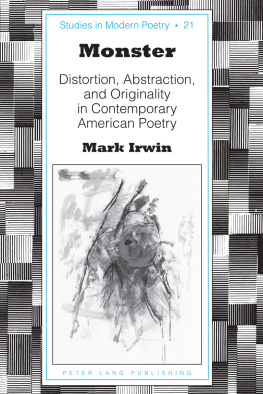
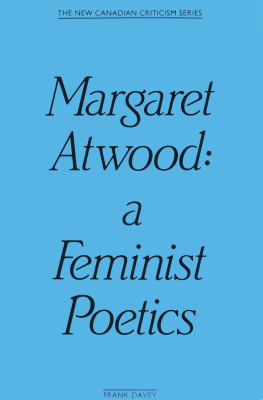
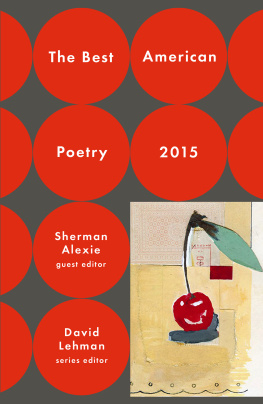
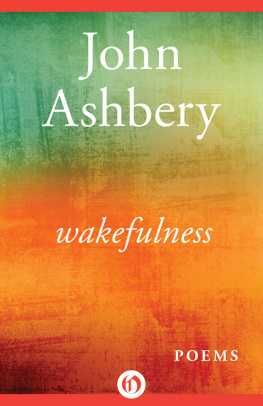
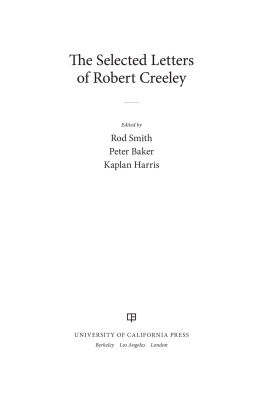
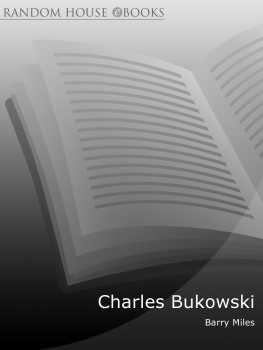

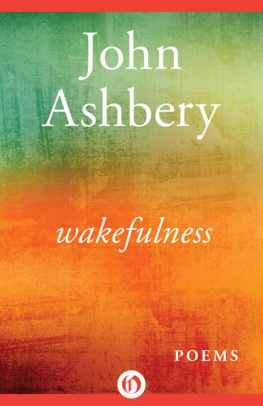
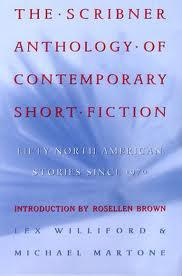

 Forty years ago, two professors working independentlyHarvards Walter Jackson Bate and Yales Harold Bloomchanged the way we think about literary tradition.
Forty years ago, two professors working independentlyHarvards Walter Jackson Bate and Yales Harold Bloomchanged the way we think about literary tradition.